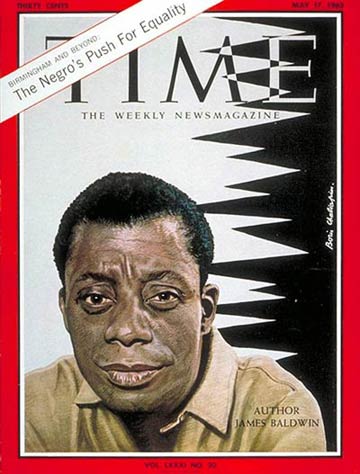
James Baldwin
(3 of 4)
The lengths to which Harlem-born Baldwin, the son of a Baptist preacher, tried to escape the association with Africans—with Negroes, really—was pathetic. Baldwin himself avoided eating watermelon for years. At home, "one's hair was always being attacked with hard brushes and combs and Vaseline; it was shameful to have 'nappy' hair. One's legs and arms and face were always being greased, so that one would not look 'ashy' in the wintertime. One was always being mercilessly scrubbed and polished, as though in the hope that a stain could thus be washed away . . . The women were forever straightening and curling their hair, and using bleaching creams. And yet it was clear that none of this would release one from the stigma of being a Negro; this effort merely increased the shame and rage. There was not, no matter where one turned, any acceptable image of oneself, no proof of one's existence. One had the choice, either of 'acting just like a nigger' or of not acting just like a nigger—and only those who have tried it know how impossible it is to tell the difference."
North & South. White liberals are often unable to see the Negro in human terms, and the sensitive Negro antenna can read that fact deep in the liberal's mind ("Let the liberal white bastard squirm," broods a Negro character in Baldwin's Another Country). Baldwin cites a passage from Beatnik Author (On the Road) Jack Kerouac to make his point: "At lilac evening I walked with every muscle aching . . . wishing I were a Negro, feeling that the best the white world had offered was not enough ecstasy for me, not enough life, joy, kicks, music . . ." Says Baldwin: "I would hate to be in Kerouac's shoes if he should ever be mad enough to read this aloud from the stage of Harlem's Apollo Theatre."
Baldwin perceives curious differences in white attitudes in the North and South. Negroes, he writes, represent nothing to the Northerner personally, "except perhaps the dangers of carnality. He never sees Negroes. Southerners see them all the time. Northerners never think about them, whereas Southerners are never really thinking of anything else. Negroes are, therefore, ignored in the North and are under surveillance in the South, and suffer hideously in both places ... It seems to be indispensable to the national self-esteem that the Negro be considered either as a kind of ward, or as a victim. They are two sides of the same coin, and the South will not change—cannot change —until the North changes."
Change. Baldwin offers no easy answers for an end to the rage and the terror. The Black Muslims, with their philosophy of separatism, frighten him. "I consider them really irresponsible in the most serious way—irresponsible in terms of what I consider to be their obligations to the Negro community, as all racists are irresponsible. They batten on the despair of black men."
Not law, but morality is the basis of Baldwin's hopes. He says: "It is the responsibility of free men to trust and to celebrate
